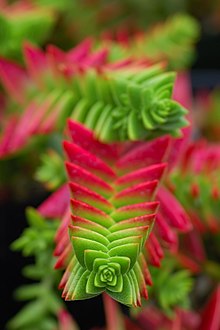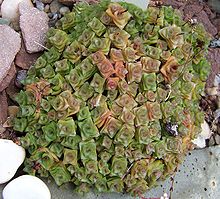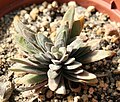Crassula is a genus of succulent plants containing about 200 accepted species, including the popular jade plant (Crassula ovata).[1] They are members of the stonecrop family (Crassulaceae) and are native to many parts of the globe, but cultivated varieties originate almost exclusively from species from the Eastern Cape of South Africa.[2]
| Crassula | |
|---|---|
 | |
| Crassula capitella | |
| Scientific classification | |
| Kingdom: | Plantae |
| Clade: | Tracheophytes |
| Clade: | Angiosperms |
| Clade: | Eudicots |
| Order: | Saxifragales |
| Family: | Crassulaceae |
| Subfamily: | Crassuloideae |
| Genus: | Crassula L. |
| Type species | |
| Crassula perfoliata L. | |
| Species | |
Many, see text | |
| Synonyms | |
| |
Crassulas are usually propagated by stem or leaf cuttings. Most cultivated forms will tolerate some small degree of frost, but extremes of cold or heat will cause them to lose foliage and die.
Taxonomy
Crassula was first formally described by Carl Linnaeus in 1753 with 10 species.[3]
Etymology
The name crassula comes from the Latin adjective crassus, meaning thick, referring to the thickening of the succulent leaves.
List of selected species
- Crassula alata
- Crassula alba
- Crassula alpestris (Sand-Coated Crassula)[4]
- Crassula alstonii
- Crassula aquatica (common pigmyweed, water pygmyweed)
- Crassula arborescens (silver dollar plant, beestebul)
- Crassula atropurpurea
- Crassula ausensis
- Crassula ausensis ssp. titanopsis
- Crassula barbata

Crassula barbata - Crassula barklyi (rattlesnake tail, wurmplakkie)
- Crassula biplanata
- Crassula brevifolia
- Crassula capitella

Crassula capitella 'Campfire' - Crassula capitella ssp. thyrsiflora (aanteel-poprosie) 'Red Pagoda'

Crassula capitella ssp. thyrsiflora 'Red Pagoda'
- Crassula capitella ssp. thyrsiflora (aanteel-poprosie) 'Red Pagoda'
- Crassula clavata
- Crassula closiana
- Crassula coccinea
- Crassula colligata
- Crassula colorata (dense stonecrop)
- Crassula columella (silinderplakkie)
- Crassula columnaris (koesnaatjie)
- Crassula connata (sand pygmyweed)
- Crassula corallina

Crassula lactea - Crassula cornuta
- Crassula cotyledonis
- Crassula cultrata (plakkiebos)
- Crassula deceptor
- Crassula decidua (norsveld plakkie)
- Crassula decumbens (scilly pigmyweed)
- Crassula dejecta
- Crassula deltoidea (silver beads, gruisplakkie)
- Crassula drummondii (small-leaf pygmyweed)
- Crassula dubia
- Crassula elegans (elegant crassula)
- Crassula erosula
- Crassula exilis
- C. exilis ssp. sedifolia
- Crassula expansa
- Crassula exserta
- Crassula extrorsa
- Crassula garibina
- Crassula gillii

Crassula nealeana - Crassula globularioides
- Crassula glomerata
- Crassula grisea
- Crassula helmsii (swamp stonecrop)
- Crassula herrei
- Crassula hirtipes
- Crassula humbertii
- Crassula hystrix
- Crassula lactea (tailor's patch, Knysna crassula)
- Crassula lanceolata
- Crassula longipes (smallseed pygmyweed)
- Crassula marchandii
- Crassula marnieriana
- Crassula mesembryanthemoides
- Crassula mesembryanthemopsis
- Crassula milfordiae
- Crassula moschata (musky stonecrop, shore stonecrop)
- Crassula multicava (fairy crassula)
- Crassula muscosa (rattail crassula, watch chain, lizard's tail, zipper plant; syn. C. lycopodioides)
- Crassula namaquensis
- C. namaquensis ssp. comptonii
- Crassula natans
- Crassula nealeana
- Crassula nudicaulis

Crassula nudicaulis var. herrei - C. nudicaulis var. herrei
- C. nudicaulis var. platyphylla
- Crassula obovata
- C. obovata var. dregeana
- Crassula orbicularis
- Crassula ovata ('jade' plant, 'money plant); syn. C. argentea, C. portulacea
- C. ovata var. cristata
- C. ovata var. monstruosa
- C. ovata undulata ('ripple jade', 'wavy jade')
- Crassula parvisepala
- Crassula pedicellosa
- Crassula peduncularis (purple stonecrop)
- Crassula pellucida
- C. pellucida var. marginalis
- Crassula pentandra[5]
- Crassula perfoliata
- C. perfoliata var. falcata (propeller plant)
- Crassula perforata (string of buttons, sosatieplakkie)
- Crassula picturata
- Crassula plegmatoides
- Crassula pruinosa (skurwemannetjie)
- Crassula pubescens (Jersey pigmyweed)
- Crassula pubescens ssp. radicans
- Crassula pubescens ssp. rattrayi
- Crassula pyramidalis

Crassula socialis - Crassula radicans (red carpet)
- Crassula rogersii
- Crassula rubricaulis
- Crassula rupestris (rosary plant, kebab bush, concertina plant, sosatiebos, inrygertjie)
- C. rupestris ssp. marnierana
- Crassula saginoides (wrinkle-seed pygmyweed)
- Crassula sarcocaulis (bonsai crassula)
- Crassula sarmentosa
- Crassula schmidtii
- Crassula sericea
- C. sericea var. hottentotta
- Crassula setulosa (South African pygmyweed)
- Crassula sieberiana (Austral stonecrop)
- Crassula socialis
- Crassula solierii (smoothseed pygmyweed)
- Crassula streyi
- Crassula subaphylla
- Crassula susannae
- Crassula swaziensis
- Crassula tecta
- Crassula tetragona
- Crassula tetramera
- Crassula thunbergiana
- Crassula tillaea (moss pygmyweed)
- Crassula umbella
- Crassula viridis (pricklyseed pygmyweed)
- Crassula volkensii
List of selected cultivars
- Crassula 'Buddha's Temple'
- Crassula 'Coralita'
- Crassula 'Dorothy'
- Crassula 'Emerald'
- Crassula 'Fallwood'
- Crassula 'Hummel's Sunset'
- Crassula 'Ivory Pagoda'
- Crassula 'Justus Corderoy'
- Crassula 'Morgan's Beauty'
- Crassula 'Moonglow'
- Crassula 'Petite Bicolor,' sometimes sold as Sedum 'Little Missy' or 'Mini Kitty', a cultivar of Crassula pellucida var. marginalis [6] 'Calico Kitten'
- Crassula 'Springtime'
- Crassula 'Tom Thumb'
Gallery
- Crassula capensis
- Crassula ciliata
- Crassula expansa
- Crassula fascicularis
- Crassula lanceolata
- Crassula orbicularis
- Crassula streyi
References
Bibliography
- Linnaeus, Carl (1753). "Crassula". Species Plantarum: exhibentes plantas rite cognitas, ad genera relatas, cum differentiis specificis, nominibus trivialibus, synonymis selectis, locis natalibus, secundum systema sexuale digestas. Stockholm: Impensis Laurentii Salvii. pp. 282–283., see also Species Plantarum
External links

 Data related to Crassula at Wikispecies
Data related to Crassula at Wikispecies































